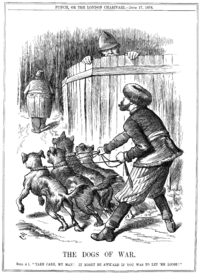
The dogs of war (phrase)
Encyclopedia

English language
English is a West Germanic language that arose in the Anglo-Saxon kingdoms of England and spread into what was to become south-east Scotland under the influence of the Anglian medieval kingdom of Northumbria...
, the dogs of war is a phrase from Act 3, Scene 1, line 273 of William Shakespeare
William Shakespeare
William Shakespeare was an English poet and playwright, widely regarded as the greatest writer in the English language and the world's pre-eminent dramatist. He is often called England's national poet and the "Bard of Avon"...
's Julius Caesar
Julius Caesar (play)
The Tragedy of Julius Caesar, also known simply as Julius Caesar, is a tragedy by William Shakespeare, believed to have been written in 1599. It portrays the 44 BC conspiracy against...
: "Cry 'Havoc!', and let slip the dogs of war". Dog
Dog
The domestic dog is a domesticated form of the gray wolf, a member of the Canidae family of the order Carnivora. The term is used for both feral and pet varieties. The dog may have been the first animal to be domesticated, and has been the most widely kept working, hunting, and companion animal in...
has its ordinary meaning; havoc is a military order permitting the seizure of spoil after a victory and let slip is to release from the leash
Leash
A leash is a rope or similar material attached to the neck or head of an animal for restraint or control...
. Shakespeare's source for Julius Caesar was The Life of Marcus Brutus from Plutarch
Plutarch
Plutarch then named, on his becoming a Roman citizen, Lucius Mestrius Plutarchus , c. 46 – 120 AD, was a Greek historian, biographer, essayist, and Middle Platonist known primarily for his Parallel Lives and Moralia...
's Lives
Parallel Lives
Plutarch's Lives of the Noble Greeks and Romans, commonly called Parallel Lives or Plutarch's Lives, is a series of biographies of famous men, arranged in tandem to illuminate their common moral virtues or failings, written in the late 1st century...
and the concept of the war dog
Dogs in warfare
Dogs in warfare have a long history starting in ancient times. From 'war dogs' trained in combat to their use as scouts, sentries and trackers, their uses have been varied and some continue to exist in modern military usage.-History:...
appears in that work, in the section devoted to the Greek warrior Aratus
Aratus of Sicyon
Aratus was a statesman of the ancient Greek city-state of Sicyon and a leader of the Achaean League. He deposed the Sicyonian tyrant Nicocles in 251 BC. Aratus was an advocate of Greek unity and brought Sicyon into the Achaean League, which he led to its maximum extent...
.
Apart from the literal meaning, parallels have been drawn with the prologue to Henry V
Henry V (play)
Henry V is a history play by William Shakespeare, believed to be written in approximately 1599. Its full titles are The Cronicle History of Henry the Fifth and The Life of Henry the Fifth...
, where the warlike king is described as having at his heels, awaiting employment, the hounds "famine, sword and fire".
The phrase has now so far entered into general usage, in books, music, film and television, that it is now regarded as a cliché
Cliché
A cliché or cliche is an expression, idea, or element of an artistic work which has been overused to the point of losing its original meaning or effect, especially when at some earlier time it was considered meaningful or novel. In phraseology, the term has taken on a more technical meaning,...
.

